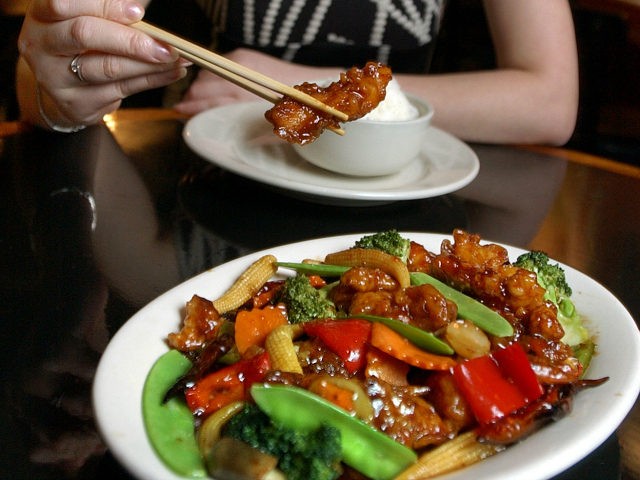Chef Peng Chang-kuei, the man recognized globally as the inventor of the popular Hunan Chinese dish General Tso’s Chicken, died this week at the age of 98. Peng, a refugee of Mao’s conquest of mainland China, said he invented the dish for a banquet in honor of an American general, and credited Henry Kissinger with the dish’s fame.
After decades of rejecting the dish, culinary historians have found evidence of the Communist state attempting to usurp the entree as a heritage artifact of Hunan province, though Peng reportedly invented it while living in Taiwan’s anti-Communist refugee community.
Peng died on Wednesday of pneumonia after a life in the culinary industry that began at age 13, according to Taiwan News. The outlet notes that, while toiling as an apprentice of a chef employed by the prime minister of the Nationalist government before World War II, he ultimately rose in stature and “was put in charge of running Nationalist government banquets.” Following their defeat at the hands of Communist mass murderer Mao Ze Dong, Peng fled to Taiwan along with those who could and had ties to the Kuomintang.
By 1952, Peng was once again organizing banquets for Kuomintang leaders. That year, he was responsible for cooking for U.S. Seventh Fleet commander Admiral Arthur W. Radford and was ordered to make dinner for his four-day visit and never repeat any dishes. “After three days, he had served the guests most of his repertoire of dishes, so to try and mix things up a bit, he decided to chop some chicken into big chunks, fry it to a golden hue and then added a different combination of sauce and seasoning to create a new dish,” the China Times reports.
He named the dish “General Tso’s Chicken” after Zuo Zongtang, modern China’s most successful general aside from Mao Ze Zong. Zuo is honored as having made major contributions to the continued union of mainland China, suppressing a Muslim rebellion in western Xinjiang a decade after playing a prominent role in the suppression of the Taiping Rebellion, a secessionist movement to form a Christian state within China.
Peng moved to the United States in 1973, where The New York Times found his dish to be a “masterpiece,” and United Nations officials, looking for a nearby lunch, frequented his restaurant.
Peng told English writer Fuchsia Dunlop, who has compiled one of the most extensive historical accounts of the dish available, that he credits Henry Kissinger for his dish finding its way onto the menus of nearly every American Chinese restaurant. “Kissinger visited us every time he was in New York and we became great friends,” he told her. “It was he who brought Hunanese food to public notice.” She notes that, as recently as 2007, Peng kept a photo of Kissinger at his desk.
Due to renewed interest in the dish’s history, triggered by both Dunlop’s work and the 2014 film The Search for General Tso, previous competing claims to having invented the dish have largely evaporated — particularly those by T.T. Wang, who opened New York’s famous Shun Lee Dynasty restaurant and is believed to have been the first chef to offer General Tso’s Chicken in the United States after trying Peng’s in Taiwan.
A claim that remains, Dunlop has written, is one in Hunan by Chinese state writers. In the book Authenticity in the Kitchen, Dunlop notes that a state-published book alleged in 2005 that Zuo Zongtang himself “loved eating this dish, and it has achieved considerable fame, spread widely, and succeeded in becoming a well-known traditional Hunanese dish.”
She notes that there is no evidence of such a claim — highlighted by the fact that no one she met in Hunan outside of highly-educated culinary elites had heard of the entree and that the dish differs significantly from traditional Hunan dishes — and attributes these attempts to “reclaim” a dish invented in Taiwan to “cultural embarrassment” on the part of the Communists.

COMMENTS
Please let us know if you're having issues with commenting.